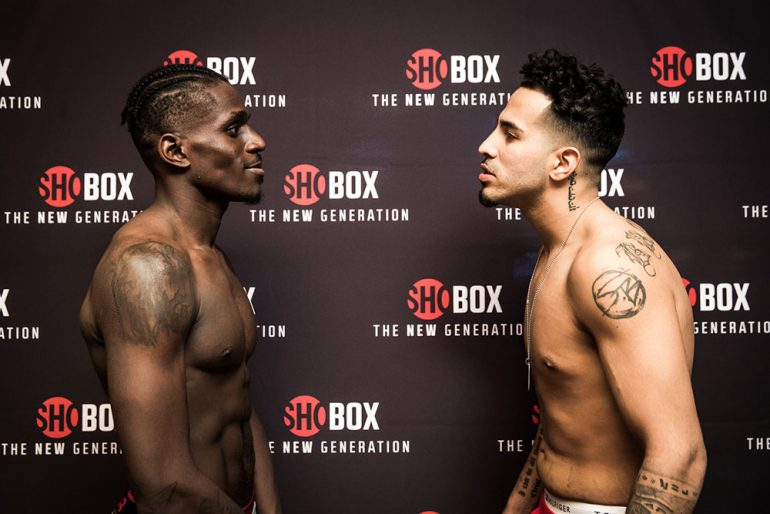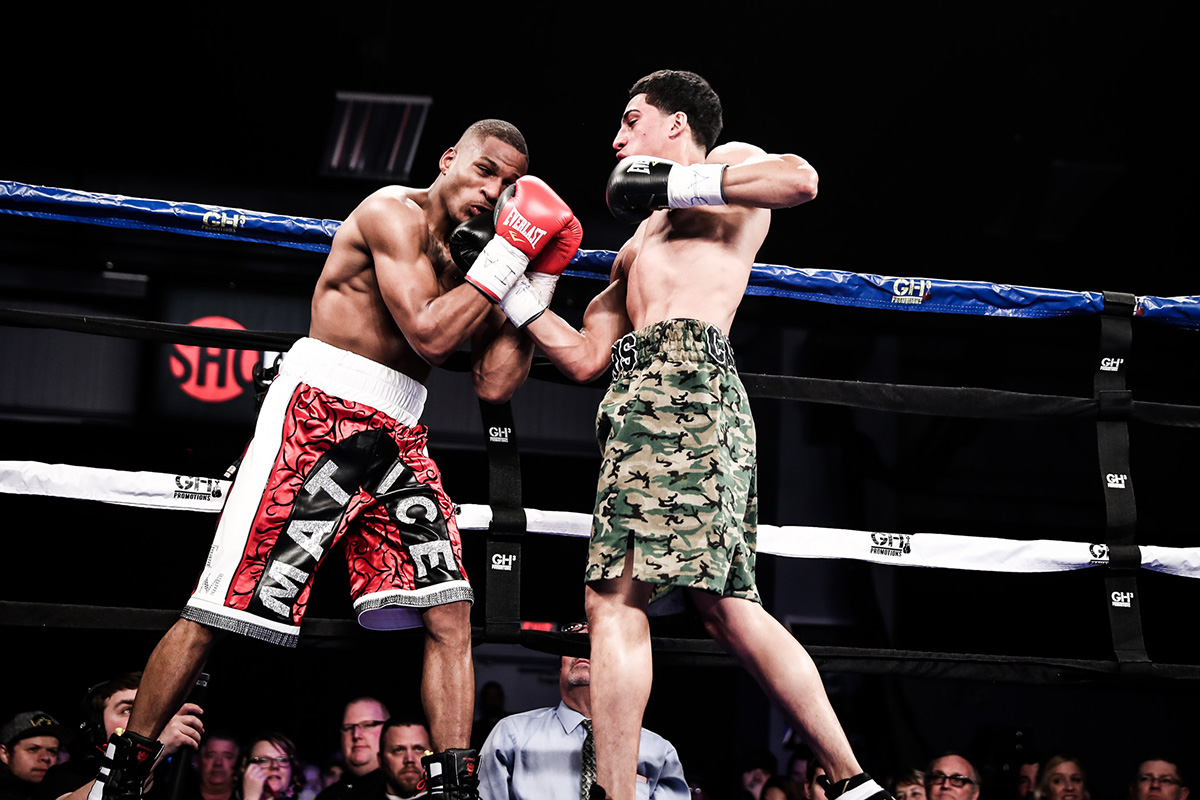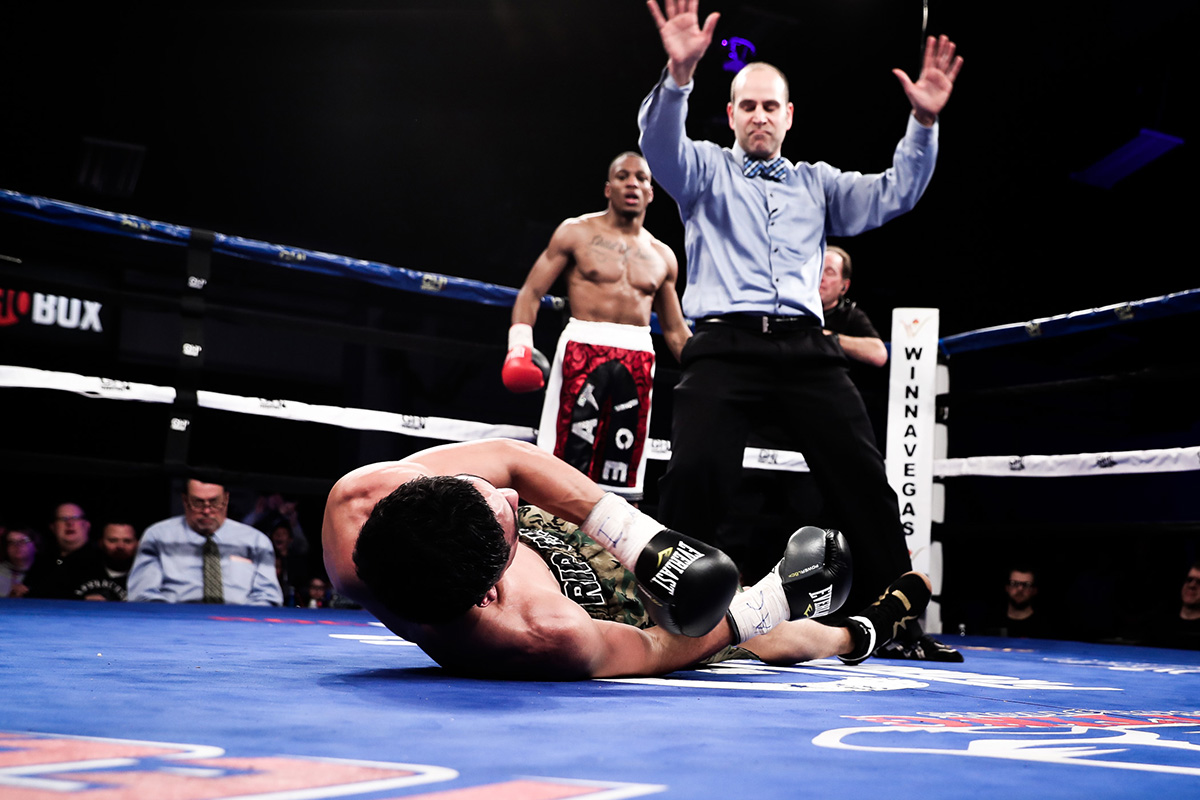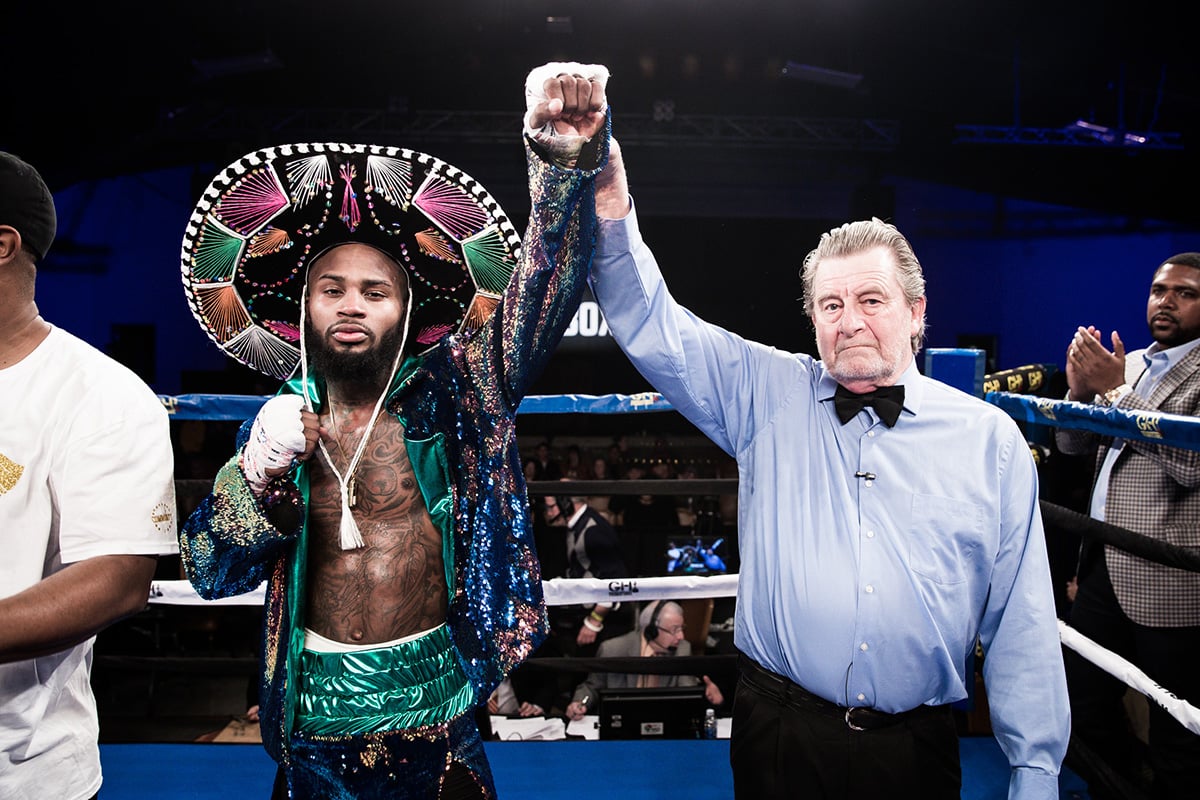The Travelin’ Man goes to Sloan, Iowa: Part 2

Friday, February 2 (continued): More often than not, judging a boxing match is like assessing a challenging work of art. Each viewer is struck by differing nuances that either resonate or repulse, and that decision is often based on one’s preferences as well as the angle and distance from which he is viewing it.
Therefore, just as various critics will arrive at different conclusions about the same piece, boxing judges will come to different verdicts about a given match. One of the most famous examples is Sugar Ray Leonard’s split decision win over Marvelous Marvin Hagler in which Lou Filippo and Dave Moretti saw a close fight (115-113 Hagler and 115-113 Leonard respectively) while Jo Jo Guerra saw Leonard a dominant 118-110 victor. A more recent example was Floyd Mayweather’s majority decision win over Canelo Alvarez in which Craig Metcalfe and Dave Moretti saw “Money” a decisive victor (117-111, 116-112 respectively) while C.J. Ross submitted a 114-114 scorecard that was so heavily criticized that, to date, she hasn’t judge another boxing match. Last year’s most striking example was the Gennady Golovkin-Canelo Alvarez draw in which Moretti (115-113 Golovkin) and Don Trella (114-114) saw a closely contested match while Adelaide Byrd turned in a 118-110 score for Alvarez. Unlike Ross, Byrd has resumed her duties as she has been present at six cards since and has judged two more title fights (Naoya Inoue-Yoann Boyeaux and Sho Kimura-Toshiyuki Igarashi).
In that vein, Fran Belchen, Jeff Sinnett and Mike Contreras produced three different results for the super middleweight bout between Ronald Ellis and Junior Younan at the WinnaVegas Resort Casino in Sloan, Iowa, the main event of tonight’s “ShoBox: The New Generation” triple-header. Belchen saw Ellis a 96-94 winner while Sinnett turned in a 96-94 scorecard in favor of Younan. But the deciding card was submitted by Contreras, whose 95-95 scorecard deemed their match a split draw. But a closer examination of the scorecards revealed that the panel agreed on seven of the 10 rounds and that the decisive decisions were made in rounds two, four and five.
Although judges are charged to look at aspects beyond the raw stats – to which they don’t have access — the CompuBox numbers, when overlaid with the judges’ round-by-round scoring, reveal several intriguing dynamics.

Photo by Amanda Westcott – Showtime
*In round two, Bechen saw Ellis a 10-9 winner while Sinnett and Contreras voted for Younan. Although Ellis threw more punches (56 to 39) and landed more of them (12 to 7 overall), they threw nearly the same number of power punches (26 for Ellis, 27 for Younan). However, Ellis led 11-6 in landed power shots and he prevailed 42%-22% in power accuracy. Also, Ellis performed better in the round’s final minute as he went 8 of 28 overall and 8 of 18 power to Younan’s 4 of 18 and 4 of 13 respectively, a development that could have been influential.
*In round four, Contreras voted Younan a 10-9 winner while Bechen and Sinnett saw Ellis the 10-9 victor. Here, the stats were close in every way as each man landed 12 total punches (Younan led 2-1 in jab connects, Ellis prevailed 11-10 in landed power shots) and the power punch percentages were close (39.3% for Ellis, 40% for Younan). Ellis threw more punches (43 to 34 overall and 28 to 25 in power attempts) but Younan was more accurate (35%-28% overall, 22%-7% jabs). The minute-by-minute breakdowns saw Ellis fighting at a more even pace (3 of 13, 6 of 18, 3 of 12 in overall punches) while Younan’s had peaks and valleys (5 of 16, 2 of 6, 5 of 12).
*Round five saw the same judging split as round two – 10-9 Ellis for Bechen and 9-10 Younan for Sinnett and Contreras – but the statistical breakdown was different In that Younan out-landed Ellis 10-8 overall, 3-2 jabs and 7-6 power. While Ellis was more active – he threw 44 punches to Younan’s 39 — Younan led 29-28 in attempted power punches, and he was more accurate in all three phases (26%-18% overall, 30%-13% jabs and 24%-21% power). Unlike round four, it was Younan who was the steadier fighter in terms of minute-to-minute production (4 of 10, 3 of 18, 3 of 11 to Ellis’ 1 of 9, 6 of 21 and 1 of 14).

Photo by Amanda Westcott – Showtime
Somewhat surprisingly, the panel agreed that Ellis won four of the final five rounds, with Younan’s eighth-round surge giving him his only round of the stretch. That rally took place in the round’s second minute (14 of 48 total punches, 12 of 45 power shots to Ellis 2 of 14 and 2 of 13 respectively), which resulted in Younan leading 19-12 overall and 17-9 power. Younan fired 70 power shots in the round, by far his highest total of the fight (his next best total was 39 in round one, a round in which he landed 16, his second-highest total of the bout). Impressively, Younan’s best round took place just three minutes after Ellis produced his (20 of 82 overall, 17 of 53 power).
In rounds 6-10, Ellis out-landed Younan 61-56 overall, 10-8 jabs and 51-48 power while averaging 57.8 punches per round to Younan’s 44.2. Both men’s production fluctuated wildly as Ellis threw 42, 82, 51, 36 and 78 punches (landing 4, 20, 12, 4 and 21) while Younan attempted 25, 48, 76, 22 and 50 (landing 3, 12, 19, 3 and 9).
Still, after the bout’s many fits and starts in terms of pacing and production, the fight was incredibly close entering the 10th, both judicially and statistically. Through nine rounds each man had landed 96 total punches, with Ellis holding a 79-76 lead In terms of power connects while Younan had a 20-17 edge in landed jabs. The margins remained close entering the final minute of the contest (10 of 46 overall for Ellis, 6 of 26 for Younan), but the final 60 seconds saw Ellis put on a finishing kick as he landed 11 of his 32 total punches to Younan’s 3 of 24, including 9 of 27 power shots to Younan’s 2 of 19. As a result, Ellis ended the fight with connect leads of 117-105 overall and 97-83 power to offset Younan’s 22-20 edge in landed jabs. The round-by-round breakdowns revealed that Ellis led 5-4-1 in overall connects and 6-4 in landed power shots while Younan held a narrow 3-2-5 lead in jab connects.
Though Younan was more accurate overall (25%-22%) and in jabs (23%-9%), Ellis was the more precise power hitter (31%-25%), which, combined with his final-minute burst, created the impression that he should have been declared the narrow winner.
While both men maintained their unbeaten records – Ellis is now 14-0-2 (10) while Younan is 13-0-1 (9) – neither was happy about it, and both talked about a rematch.
“I thought I pulled it out,” Ellis said. “I closed the show at the end. I was pressuring him and the fans know I won. In the eighth, he landed a couple of shots but he wasted his energy. As you saw, he didn’t do anything the rest of that round, and after that round he had nothing left. He was running from the start, so I knew I could land shots on him anytime. My only regret is I wish that I got him out of there. It’s all knockouts from here on out. I would definitely fight him again, but I’ll do whatever my promoter lines up for me.”
Younan, of course, perceived the proceedings differently.
“I thought I won the fight,” he said. “I thought he won maybe three rounds. My best round was the eighth – I had him in the corner and I really thought they were going to end the fight then. I was surprised they didn’t stop the fight. I can improve a little bit, I feel I can finish stronger. I’ve only had one eight-round fight before this so this was a big step up for me. I’m growing and learning every fight. I’m heartbroken right now. I wanted to win that fight. I want him in a rematch. I know I would win. I know what to do and what not to do.”
Only a rematch would prove Younan right or wrong in terms of his last two sentences. While their styles didn’t mesh perfectly, a second fight likely will resolve all lingering questions, not just in terms of who is the better fighter but if Younan, who was declared a prodigy at age 10 by the New York media, can sufficiently raise his level enough to justify the hype. Based on this fight and the trouble he had against 36-year-old fireplug Mike Guy six months earlier, he has plenty more to prove. The good news is that, at age 22, Younan still has time to make positive changes.
*
While waiting for the hotel shuttle to take me to the WinnaVegas to do some morning interviews, I spoke with one of Rolando Chinea’s seconds about tonight’s bout with 10-0 lightweight Thomas Mattice. He painted a pleasing picture of his 15-1-1 (6) charge: A quiet, bespectacled Christian outside the ring, the 26-year-old native of Caguas, Puerto Rico turns into a beast whenever he slips on the gloves. Whether in training or in official combat, Chinea was focused, dedicated and beastly. Having seen him beat O’Shaquie Foster and Kenneth Sims Jr. from ringside and having counted his only loss to date from video (a wildly active eight-round majority decision to Ismail Muwendo in which they averaged a combined 212.3 punches per round), I could certainly attest to his violent in-ring persona.

Photo by Amanda Westcott – Showtime
Larry Merchant once described Joe Frazier as a “truth machine” because his all-out style revealed not only the content of his own character but also that of his opponent – at least in terms of his conditioning as well as his ability (and willingness) to overcome adversity. Chinea’s uncompromising relentlessness carries similar qualities, and that’s why he was able to reveal enough shortcomings in Foster and Sims to emerge victorious. Unlike Ellis and Younan in the main event, Chinea brings the heat every single minute of every single round and it is up to the opponent to either conjure an antidote or be buried under an avalanche of leather.
For six rounds and 72 seconds Chinea was having his way. After throwing 90 punches in each of the first two rounds, Chinea exceeded his team’s goal of 100 punches per round in rounds three through six by firing 121, 122, 95 and 115, or 113.3 per round. He was statistically dominant as he produced connect leads of 202-115 overall, 61-42 jabs and 141-73 power, and trailed just 32.1%-31.9% in overall accuracy while leading 37%-36% in power precision. Moreover, entering the seventh, he was ahead by four points on all scorecards. With Mattice’s gas tank seemingly waning, Chinea appeared to have the Cleveland native just where he wanted him.
But, as is often the case with boxing, story lines can be transformed by a single punch.
With Chinea’s back to the ropes, Mattice landed a flush right to the jaw that caused the steel within the Puerto Rican’s body to soften noticeably. “Uh oh, he’s hurt,” I said to no one in particular. “If he spots it, he can get him.”
Unfortunately for Chinea, Mattice did spot it, and, just 16 seconds later, he got him. The sight of Chinea’s stricken physique injected a prodigious dose of adrenaline that produced a 41-punch outburst culminated by a hook to the jaw that scored the fight’s only knockdown and prompted referee Adam Pollack to immediately wave off the fight. In the final minute of the bout – which lasted only 29 seconds – Mattice out-landed Chinea 20-3 and rendered moot Chinea’s leads of 216-141 overall, 69-50 jabs and 147-91 power.

Photo by Amanda Westcott – Showtime
Mattice was a blank slate for me because none of his recent fights were available on video, but this come-from-behind victory against his best opponent to date shows he has the mental strength to keep the faith even in the late rounds of a losing fight, the physical mettle to produce the goods when absolutely necessary, the acuity to spot an opportunity others might miss and the killer instinct to go all out and cash in that opportunity. Could this victory lift Mattice to a new level or will the fact that Chinea’s pressure dominated him to that point be a sign from which future opponents can draw hope? For now, Mattice should be proud of what he achieved, and my guess is that I’ll get another chance to see him do his thing from ringside.
*
As I watched Montana Love score a majority decision over Sam Teah in the telecast’s opening bout, I couldn’t help but be reminded of another undefeated up-and-coming fighter who willingly stepped into the spotlight on short notice and then defeated the favored fighter. That fighter’s name was Terence Crawford.
Less than 10 days before Breidis Prescott was to meet WBA “world” super lightweight titlist Khabib Allakhverdiev in March 2013, the Russian belt-holder was forced to withdraw due to an elbow injury. Crawford, who, despite a 19-0 (15) record, was unknown to TV viewers and little known beyond the Midwest and to some local Las Vegas audiences who had seen him defeat his last four opponents coming in. When offered the chance to step into the bright lights of an HBO card topped by Brandon Rios-Mike Alvarado II, Crawford said yes without hesitation. He validated his confidence by winning a decisive 10-round decision over the more heralded Colombian, a fight that ignited a rise to prominence that, in some circles, has landed him at number one on the pound-for-pound lists and may well end with a plaque in Canastota.

Photo by Amanda Westcott – Showtime
While Love is light years away from Crawford’s current perch, he shares “Bud’s” edgy confidence. More than once I heard Love talking to his corner, saying things like “I hear you…I’m setting him up” and “watch this.” He said it loudly and clearly enough for me to hear him through the headsets, which meant that Teah heard him as well. Love didn’t care, and, for the record, neither did Teah.
Following a challenging second round, Love found his rhythm and out-boxed Teah for long stretches. The bout’s most telling segment unfolded in rounds seven and eight, rounds Montana had not yet experienced as a pro while Teah had experienced them in beating O’Shaquie Foster and drawing with Demond Brock. While Love upped his work rate from 51 in the sixth to 53 and 55 in the seventh and eighth, Teah’s plummeted from 45 to 22 and 34. Better yet for Love is that he out-landed Teah 31-15 overall and 25-13 power in the final six minutes, expanding his connect leads to 101-72 overall, 30-11 jabs and 71-61 power. While Love was more accurate overall (30%-24%) and in jabs (24%-7%), Teah connected with 40% of his power shots while Love landed 32%. Still, Love’s superior ring generalship won out in a fight that most saw as a unanimous decision instead of the majority decision it was. Brad Rebeck’s 76-76 was overruled by the 78-74 scores submitted by Jeff Sinnett and Adam Pollack.
As stated earlier, Love has a long way to go to even approach Crawford’s perch but their launching pads appear eerily similar.
*
Andy and I caught a ride back to the hotel with stage manager JT Townsend, after which I returned to my room, entered the stats from tonight’s card into the master database, and turned out the lights a little after 2 a.m.
Saturday, February 3: I awakened four-and-a-half hours later, and despite the short timeframe I felt pretty decent, probably because I wanted to catch up on my writing before having to meet my carpool at 9:30. The two other members of the pool – cameraman Gene Samuels and replay man Dave Lilling – were staying at the WinnaVegas Resort Casino, so they had to drive over to the WinnaVegas Inn five minutes away in order to pick me up. Also, their flights were set to leave at 12:45 while mine was departing at 12:04.
Though I probably would have left a half hour earlier, Samuels got me to the airport in plenty of time and was kind enough to drop me off at the American Airlines entrance before returning the rental car and catching their mutual flight on United. Remembering my experience in Pittsburgh, I placed one of my laptops into a separate bin but asked the TSA agent whether that was required.
“Not really,” I was told. “It depends on the preferences of the individual screener.” Great.
Once I cleared security I walked toward my gate. As I did so I heard someone shouting my name. That someone was Marc Abrams, who was on the same Omaha-to-Charlotte flight as I was. Flying with him were Teah, Chinea and their respective teams, and, after Marc introduced me to them, the waiting time, which was nearly an hour, seemed abnormally brief. To me, high-level boxing talk has a way of melting the minutes away.
Once I landed in Charlotte, I experienced an unusually long layover of nearly two-and-a-half hours, most of which I spent transcribing interviews and talking with a pair of flight attendants who were preparing for a Miami flight at a nearby gate. I asked one about the most number of flights she worked in a given day. “Seven,” was her answer.
As I settled into my aisle seat on the Charlotte-to-Pittsburgh flight, my two seatmates and I spotted the last person to enter the aircraft, a somewhat bedraggled twenty-something male with a sour look on his face.
“I can’t believe they let him on this flight,” the man to my immediate left said. When I asked why, he replied that his volcanic outbursts, which the man said was probably fueled by excessive alcohol consumption, had already had him kicked off one airplane and placed him on the verge of arrest. He also said that several TSA officials and police officers had talked to this person and told him, in no uncertain terms, that he was being given a final chance to behave in a socially acceptable manner. As far as I could tell, he did just that.
As I exited the aircraft and looked up at the monitor, I saw something I had not seen before – no pending flights. Apparently, we were the last plane scheduled to land this day, and as I walked past the security area I saw the TSA officials taking down the barriers. Being that it was just past 7:30, I thought this was unusually early for this to be happening.
After scraping a couple of inches of snow and ice from my car, I made a couple of “I’m all right” phone calls and then started home. Two hours and fifteen minutes later I pulled into my driveway and officially ended my latest Travelin’ Man journey. The next one will begin in less than two weeks’ time, when I’ll fly to Las Vegas to cover the Showtime Championship Boxing card topped by Danny Garcia-Brandon Rios.
Until then, happy trails!
*
Lee Groves is a boxing writer and historian based in Friendly, W.Va. He is a full member of the BWAA, from which he has won 15 writing awards, including 12 in the last seven years and two first-place awards since 2011. He has been an elector for the International Boxing Hall of Fame since 2001 and is also a writer, researcher and punch-counter for CompuBox, Inc. He is the author of “Tales from the Vault: A Celebration of 100 Boxing Closet Classics (available on Amazon) and the co-author of the upcoming book “Muhammad Ali: By the Numbers.” To contact Groves, use the e-mail [email protected].















